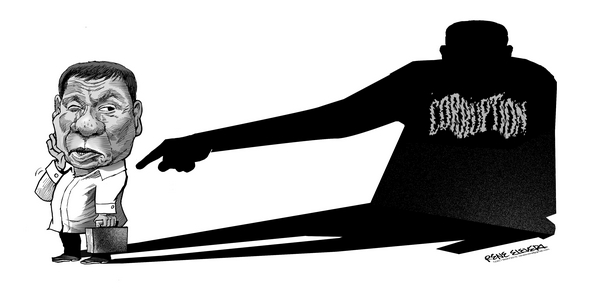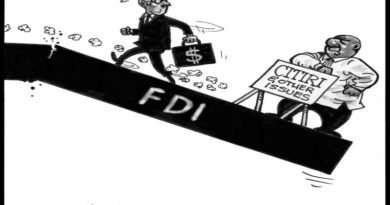Duterte’s kvetch

Duterte’s kvetch
It’s not the first time the President has complained about the magnitude of the problems he vowed to solve within the first few months of his presidency. He typically gripes about the “system” that seems resistant to his will whenever he realizes he actually needs more time to end these problems. That is what “kvetch,” a word of Yiddish origin, actually means—a habitual complaint.
But his off-the-cuff remarks last Wednesday at the oathtaking of the local government officials of Cagayan de Oro take presidential kvetching to a new level. Mr. Duterte looked physically exhausted and emotionally depressed. He seemed not merely frustrated over his inability to make a dent on corruption in government, he also sounded angry and powerless to do anything about the incompetence and opportunism of the people he had appointed to key government agencies. Beyond immediately firing these people and replacing them with new ones from his narrow circle of friends, schoolmates and fellow Davaoeños, he seemed unable to think of anything else.
ADS by Cloud 9:
– SPACE RESERVE FOR YOUR ADVERTISEMENT –

–THIS SPACE BELOW IS RESERVE FOR YOUR ADVERTISEMENT –

“I lost my enthusiasm to work,” he said in Cebuano. “Actually, I deeply regretted it; I regretted my decision to run for president.” He said that his political star had been rising since 1988 and that he had never lost an election, implying that in seeking the presidency, he just wanted to know how far he could go. This seems consistent with a view of the presidency as no more than a narcissist’s trip.
Now that he has proven that a reluctant presidential candidate like him could actually beat the country’s more established politicians, he is hard-pressed to offer a justification for his having sought the presidency in the first place. I doubt if he could find it at this late hour.
No president in recent memory ever told the nation that he or she has lost the drive to continue what he set out to do, and that he regretted seeking the presidency. It would be utterly demoralizing. People turn to their leaders for inspiration, direction and encouragement. Responsible leaders do not mock these expectations. They respond to them by explaining the nature of the issues and problems the nation confronts, what the government is doing to resolve these and what the people, collectively, can do to help.
But not Mr. Duterte. He revels in saying the most shocking things to his listeners, including his recurrent regret about being president, expecting to elicit laughter, disbelief or sympathy. He appears to know his audiences.
ADS by Cloud 9:
– SPACE RESERVE FOR YOUR ADVERTISEMENT –

Rather than as an undisguised admission of failure, he expects them to take this latest disavowal of power as one more manifestation of his essential authenticity. He wants them to believe this is one president who can be trusted to tell the truth, no matter how painful it is. Mr. Duterte himself says it for them. In the same speech, he asked: “If you ask me if I’m happy now, I won’t lie. Why would I? I do not have any obligation to you to lie, to tell a lie. I’m sick and tired of the system.”
The “system” — I don’t think he simply means by this term the prevailing culture of corruption in government. Clearly, he uses the word “system” as a shortcut for everything that frustrates him.
I will hazard a guess and say that I think he probably means it in at least two ways. First, he could be using it as a code word for a reality whose complexity is impervious to the kind of commonsensical solutions he has developed and tested as chief executive in the limited environment of Davao City. Second, he could be referring to the democratic way of doing things that upholds the rule of law, respects the separation of powers and recognizes the constitutional limits of executive power.
Whether the problem is corruption, or the drug menace, or the communist insurgency, or China’s aggressive behavior in the West Philippine Sea — Mr. Duterte seems to think it’s all reducible to the President being able to demonstrate his personal sincerity, willfulness and determination. That is why his preferred method is a sweeping approach in which, in forceful rhetoric, he stakes not only his credibility but his own life.
I argue that in so doing, he commits the fatal mistake of ignoring the historical and social complexity of these problems.
ADS by Cloud 9:
– SPACE RESERVE FOR YOUR ADVERTISEMENT –

Each one of these problems has components that are not amenable to central control (but are rather subject to myriad local rules of operation), and they typically produce forms of adaptive behavior that cannot be easily tracked down. There are no simple motives that one could point to in accounting for these behavioral patterns. They proliferate in unknown ways because their functionality is usually not visible to the average observer.
Mr. Duterte scoffs at the stubbornness of such complex systems as corruption, drug addiction and the communist rebellion. He seems to believe that if you kill all the drug addicts and drug pushers in the neighborhood, the fear that this creates would be enough to deter others from getting into the habit. Such astounding naivete ignores the deep roots in society of the political economy of the drug trade. It also ignores the role that recreational drugs play in easing the hidden injuries of the poor.
Unfortunately, this is a mindset that Mr. Duterte shares with his legion of admirers. Faced with the complexity of things, he can only respond with the crude tools of the charismatic leader—violence, intimidation and the ability to enchant. His admirers, in turn, can only respond by giving him their full trust. For trust is the most instinctive way to reduce complexity.
[email protected] / Philippine Daily Inquirer
ADS by Cloud 9:
– SPACE RESERVE FOR YOUR ADVERTISEMENT –










